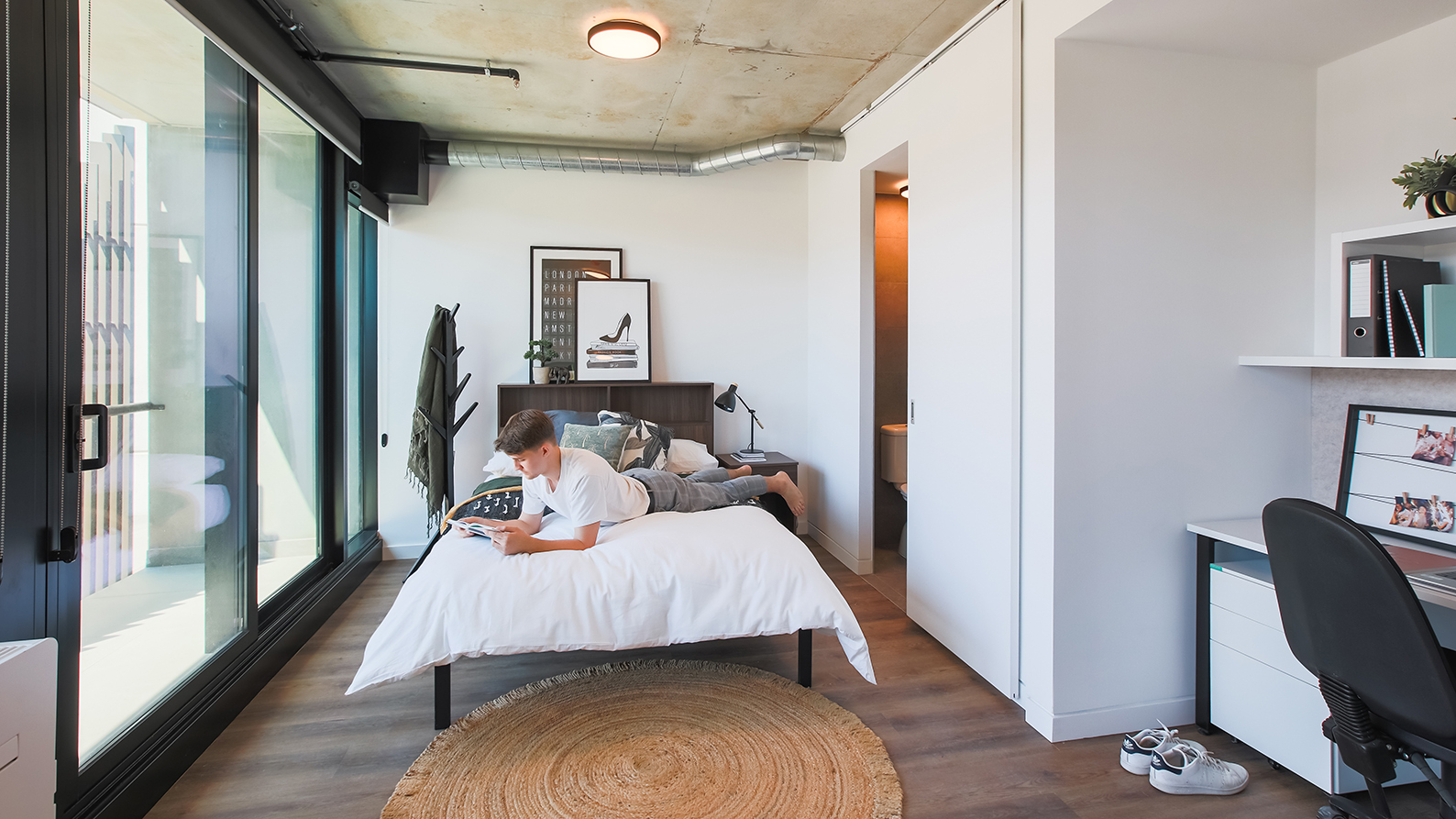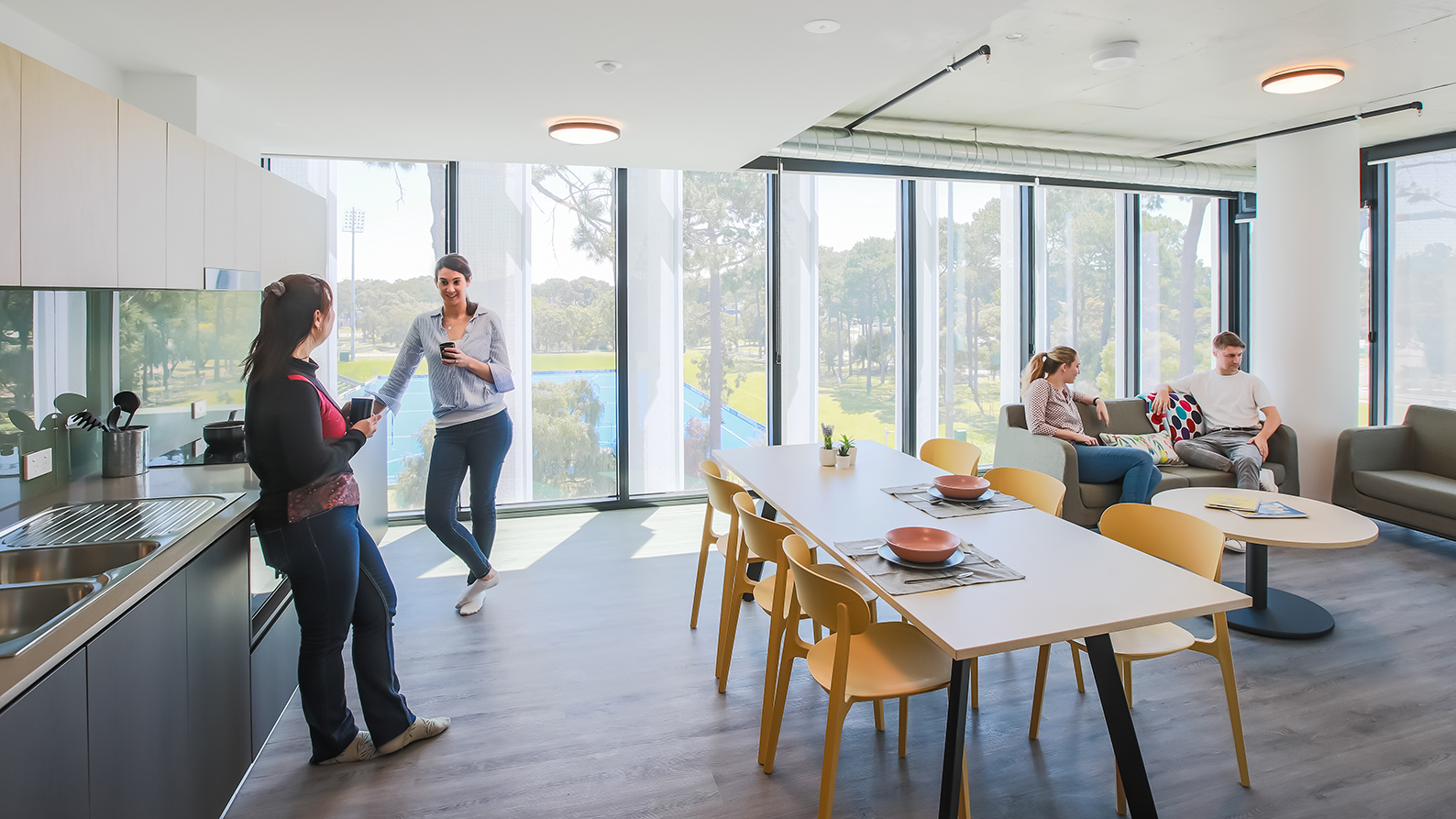Applications will soon be open for students to live at Curtin University’s new on-campus accommodation from next year, marking a new era of Australian on-campus living for students.
Almost 1000 new beds will be available at two purpose-built student offerings, located in Curtin’s industry-connected innovation precinct called Exchange, with the University offering special launch incentives for the inaugural cohort of 2022.
The new accommodation offers a diverse range of options for students from the fully catered offerings at the 407-room St Catherine’s College to the self-catered options in UniLodge’s new 10-storey, 517-bed Hall of Residence, known as Twin Dolphin Hall.

Both residences are located within Curtin’s Exchange precinct, which also features the Nesuto Curtin 60-room boutique hotel, 38 self-contained Zamia Apartments and will include a grocery store as well as a range of food and beverage outlets.
Curtin students who are admitted to St Catherine’s College in 2022 will receive the Curtin Award of $7,500 to be used towards their residential fees.
All students living at UniLodge accommodation next year will each receive the Curtin Bonus of a 50 per cent reduction in the weekly room rent.
Rural, regional, remote, interstate and Curtin Medical School students will be guaranteed a place in either St Catherine’s College or the other on-campus UniLodge accommodation. Metropolitan and international students will also be welcomed to enrich their education by living on campus.
Curtin University Vice-Chancellor Professor Harlene Hayne said the new residences offered students a life-changing investment in their future, with international research confirming the value of on-campus student living.
“Across the globe, the research consistently shows that students who choose to live on campus achieve better grades, are more likely to continue with their studies, feel more connected and generally happier than their peers who either rent or live at home,” Professor Hayne said.
“When students are actually living in their learning community, studies show they do substantially better. They show young people will be better students because they are living on campus, surrounded by hundreds of like-minded peers with similar hopes, ambitions and dreams.
“I am beyond thrilled that Curtin will be able to offer the incredible benefits of on-campus living to young people, particularly those from rural, regional and remote areas, as part of 1000 new student accommodation places set to open in the buzzing on-campus innovation precinct next year.

Professor Hayne said the $7,500 Curtin Award for St Catherine’s College and the 50 per cent Curtin Bonus for UniLodge would be available for all Curtin students who took up the opportunity to live on campus in 2022.
“In celebration of this momentous occasion, the University is offering these incentives to all Curtin students living in the University’s accommodation for the first year of this exciting new experience,” Professor Hayne said.
“As a product of the US college experience and a mother of two daughters who enjoyed the lasting benefits of on-campus living and learning, I am delighted to be able to offer this life-changing experience to Curtin students.”
St Catherine’s College Head of College Fiona Crowe said the college was delighted to be joining Curtin University in delivering a world-class, on-campus student experience.
“With more than 70 years’ experience, we know how positive and long-lasting the impact can be when students live together in a close-knit, vibrant, highly motivated, socially and academically rich environment,” Ms Crowe said.
“The opportunities and extension afforded to students in a leading college deepens the connection and access to faculty, industry leaders and global change-makers, heightens the fun of making life-long friendships, shapes their futures and ensures they leave university with so much more than their degree. As the first College at Curtin, we are very excited about what lies ahead.”
UniLodge Australia Chief Operating Officer Matt Row said the new accommodation offering at Curtin presented an exciting opportunity for students.
“This brand new complex alongside important Curtin landmarks and services offers more room types, fitted out to the highest quality, to increase the choice for students,” Mr Row said.
“We are looking forward to welcoming more students than ever before to live and learn in student accommodation at Curtin.”
For more information about Curtin’s new student accommodation, visit here.
For more information about Curtin Exchange, visit here.
* The CIRP Freshman Survey conducted by the Higher Education Research Institute at UCLA, which canvases millions of US college students each year, has repeatedly shown that living in a residence hall had a positive impact on the students’ degree attainment. Other studies of the US college experience have found first-year students reported higher-quality interactions with other students as a result of being close to them every day and that the ongoing senior students were more engaged with faculty staff than their off-campus peers.
* A recent report released by the National Centre for Student Equity in Higher Education, based at Curtin, found that students living on campus reported significantly higher levels of overall satisfaction and greater overall positive benefits of relationships and experiences of social connectedness while at university when compared to those living in private rental accommodation.
* In 2019, the Federal Government’s National Regional, Rural and Remote Tertiary Education Strategy identified that regional, rural and remote students are less likely to either access higher education or complete their studies than their metropolitan peers.



